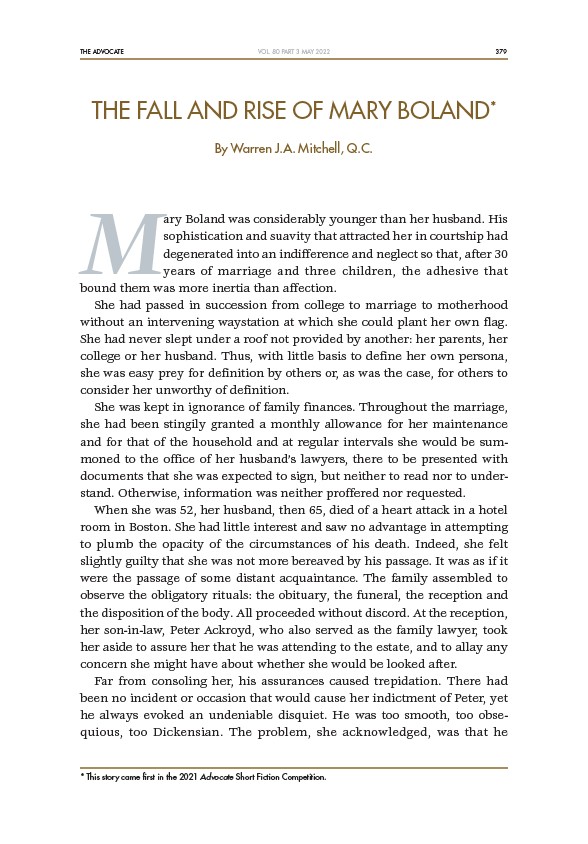
THE ADVOCATE 379
VOL. 80 PART 3 MAY 2022
THE FALL AND RISE OF MARY BOLAND*
By Warren J.A. Mitchell, Q.C.
M ary Boland was considerably younger than her husband. His
sophistication and suavity that attracted her in courtship had
degenerated into an indifference and neglect so that, after 30
years of marriage and three children, the adhesive that
bound them was more inertia than affection.
She had passed in succession from college to marriage to motherhood
without an intervening waystation at which she could plant her own flag.
She had never slept under a roof not provided by another: her parents, her
college or her husband. Thus, with little basis to define her own persona,
she was easy prey for definition by others or, as was the case, for others to
consider her unworthy of definition.
She was kept in ignorance of family finances. Throughout the marriage,
she had been stingily granted a monthly allowance for her maintenance
and for that of the household and at regular intervals she would be summoned
to the office of her husband’s lawyers, there to be presented with
documents that she was expected to sign, but neither to read nor to understand.
Otherwise, information was neither proffered nor requested.
When she was 52, her husband, then 65, died of a heart attack in a hotel
room in Boston. She had little interest and saw no advantage in attempting
to plumb the opacity of the circumstances of his death. Indeed, she felt
slightly guilty that she was not more bereaved by his passage. It was as if it
were the passage of some distant acquaintance. The family assembled to
observe the obligatory rituals: the obituary, the funeral, the reception and
the disposition of the body. All proceeded without discord. At the reception,
her son-in-law, Peter Ackroyd, who also served as the family lawyer, took
her aside to assure her that he was attending to the estate, and to allay any
concern she might have about whether she would be looked after.
Far from consoling her, his assurances caused trepidation. There had
been no incident or occasion that would cause her indictment of Peter, yet
he always evoked an undeniable disquiet. He was too smooth, too obsequious,
too Dickensian. The problem, she acknowledged, was that he
* This story came first in the 2021 Advocate Short Fiction Competition.